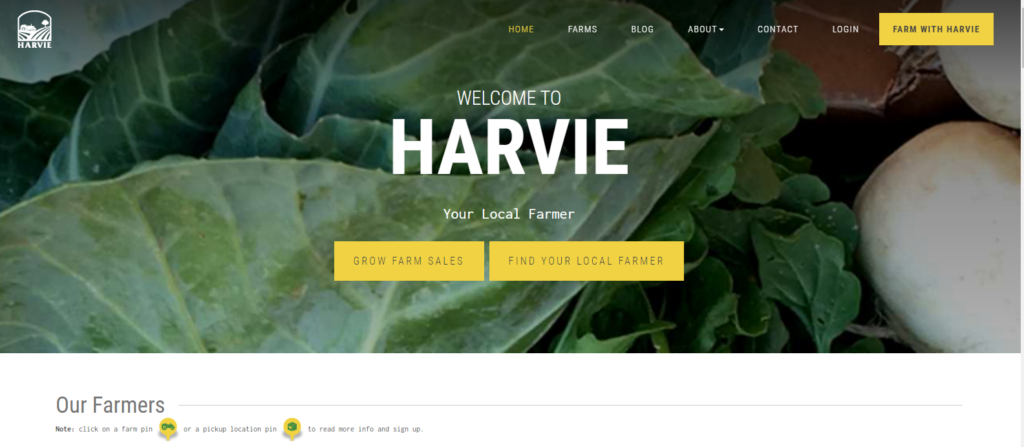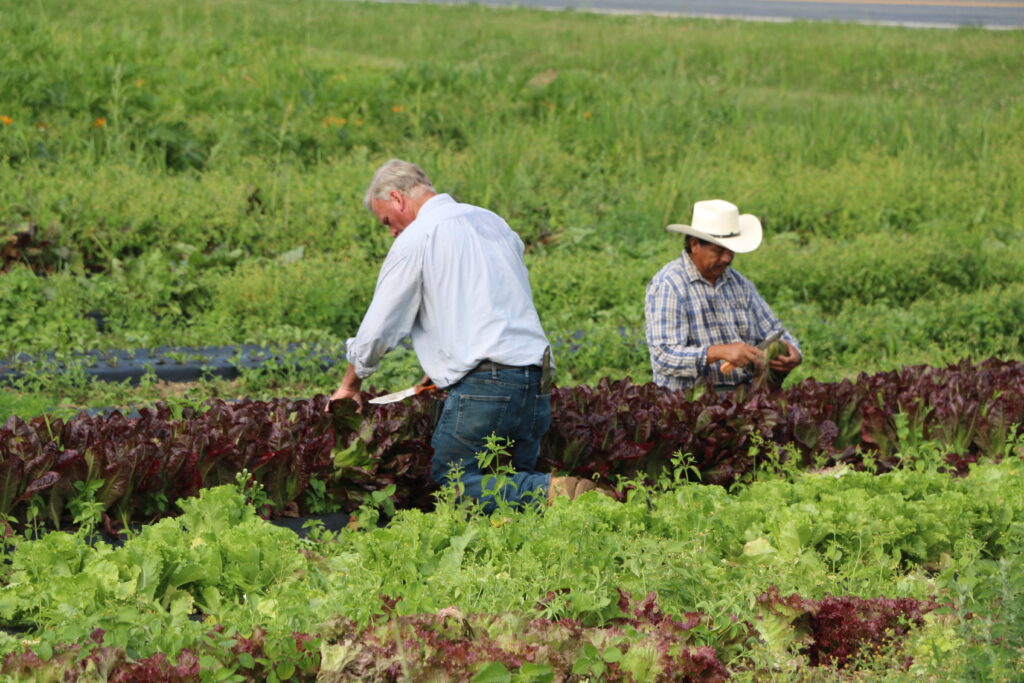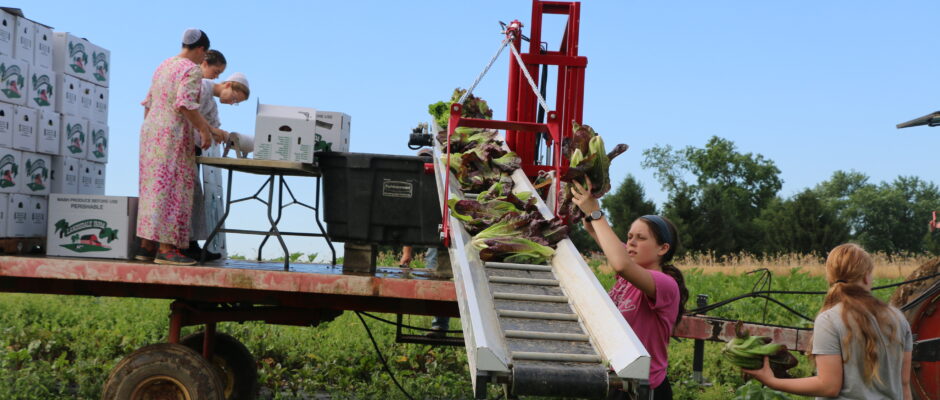While 2020 has been a struggle for many, it has had its silver linings for Pennsylvania farmers like Dan Landis. Business derived through his Community-Supported Agriculture (CSA) program — as well as other direct-to-consumer sales — is booming, partially because of COVID-19.
In addition to the CSA, Landis sells fresh produce at two farmers markets: one at his 111-acre Landisdale Farm in Lebanon County and the other in West Philadelphia’s Clark Park. CSA-member participants pick-up fresh food either in the city or at his farm.
According to Brian F. Moyer, an educational program associate at Penn State Extension in Lehigh County, growing CSA participation is a statewide phenomenon. As part of his job, Moyer instructs farmers on how to sell directly to consumers via three avenues: CSAs, local farmers’ markets, and on-farm markets.

“As soon as COVID-19 hit and the panic buying in grocery stores happened, that then led to shortages in the greater food supply chain,” recalls Moyer. “People turned to their local farms, and those farms sold out their [CSA] shares very quickly. In all cases, with the farms that I’ve talked to, they now have waiting lists.”
A marketing concept first launched in the early 1990s, CSAs allow farmers to sell “shares” at a set price prior to the growing season and then distribute the weekly harvest to participating customers. The model provides stability for farmers: They get capital up front and know where their perishable produce is going. While most CSAs feature a variety of fresh fruits and vegetables, some also offer meat, dairy products and commodities such as eggs, honey, and apple cider.
“CSA consumers share the risk that there will be a harvest but also enjoy the rewards when there is a harvest,” explains Moyer. “Each week, a consumer either drives to the farm or to a designated pick-up site to get their weekly share of farm-fresh produce. As the growing season changes, so do the goods a consumer receives that week.”
As soon as COVID-19 hit and the panic buying in grocery stores happened, that then led to shortages in the greater food supply chain. People turned to their local farms.
Landis, who has just under 100 CSA shareholders, says that number could easily be much higher this year.
“We had to turn some people down,” he explains. “But sometimes you have no choice and have to do what you have to do. We have a lack of available manpower to serve more customers.”
Landis and his wife purchased the farm from his parents in 2017. The 15 acres Landis uses for the CSA (which launched in 2006) yield a cornucopia of vegetables for his customers in Lebanon County and Philadelphia, as well as wholesale markets in New Jersey and New York. Everything the farm sells is USDA-certified organic, including grass-fed beef, free-range chicken and pork, and locally sourced eggs and dairy products.
The surge in consumer participation in CSAs is welcome news to Pennsylvania farmers who had witnessed buyer interest level off in recent years.
“We believe the interest in farms that wanted to market their products that way had increased,” explains Moyer, “but consumers who wanted to buy their food in that manner didn’t keep up with [farmer] demand.”

The traditional CSA model does have its challenges.
“It can be a real struggle to get new customers,” says Moyer. “The biggest reason consumers quit a CSA is because farmers tend to give extra [produce] in each week’s box. If a consumer can’t use all they get — or if they get an item they really don’t like — that food ends up going to waste. Most consumers do not like to waste food.”
One way to address this concern is to allow members to select from an online list, curating their weekly harvest. While that can improve the experience for CSA shoppers, it creates more work for farmers since they have to customize orders.
“The CSAs have developed over time from where they used to be,” says Moyer. “You used to just get a box of whatever was harvested that week. And then to attract more customers, who wanted more convenience and more choice, farmers started to allow customers to come to the farm, order online or place an order at the pick-up site.”
Simon Huntley founded his Pittsburgh-based company Harvie in order to connect consumers with CSAs and farmers’ markets. With over 100,000 active users and more than 200 CSAs in its database, Harvie is a powerful tool connecting American farmers with dedicated locavores.

“We’re looking for the convenience, the use of technology and the ease of purchase that you would have through something like Amazon,” says Huntley. “Joining that with what is happening with CSAs, and farmers’ markets, and the ability to purchase directly from local farms. The beauty of Harvie is that customers can set their preferences and farmers can customize every box.”
Huntley argues that the longterm success of CSAs and farmers’ markets depends on pivoting away from the old business model and embracing technology.
“What we’re trying to do is make it super easy for people to make a choice to support local farms,” he says. “And that’s what will support this local food economy going forward: making purchases convenient for consumers.”
Landis, who is a longtime Harvie user, revamped the customer service system for his CSA members this year. Instead of buying shares pre-season as they did under the old model, consumers pre-load a debit card, use it to purchase items for their box, and then reload that same card once their initial deposit is depleted. It’s similar to a transit card or EZPass.
Farmers have to be on the cutting edge of things if they want to be prosperous.Dan Landis, Landisdale Farm
“Everyone’s a little bit more happy with the new debit card system,” says Landis. “Number one, my customers only have to buy what they know they’ll use that week — they are very glad that they don’t have to waste food. The more convenient it is for them, the more likely they will come back and stay with you next year.”
No one really knows if 2021 would continue to see the same level of interest in the $250 million CSA industry. Will consumers flock back to grocery stores or will they continue to embrace other sources of food, especially following a pandemic that exposed the weaknesses in the national food supply chain? If demand remains high, will more farmers be able to open or expand their operations in 2021?
Those questions should be answered on February 28, 2021, which is recognized as National CSA Sign-Up Day and the first day most farmers begin accepting shareholders for the coming season.

“It really comes down to trust and transparency,” says Moyer. “There was a lot of trust that was lost with consumers with the food supply chain disruption. [They] were asking, ‘Why are they plowing under veggies in Florida? Why did the price of eggs jump while they are simultaneously euthanizing chickens?’ Consumers want to know why these things are happening.”
Great comfort comes from access to a reliable local food source. Penn State Extension is doing its part, releasing a market finder app for consumers, helping them locate more than 1,000 CSAs and farmers’ markets across the Commonwealth.
For Landis, who wants to retain between 85 to 90 percent of his current CSA customers in 2021 (that is nearly double the statewide average of 50 percent), it’s about finding ways to be innovative.
“Farmers have to be on the cutting edge of things if they want to be prosperous,” he explains. “Say you are selling cars: You can’t keep on selling the 2020 model. People want the next newest thing.”



